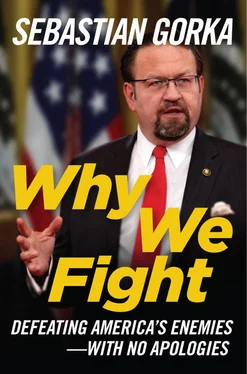Sebastian Gorka - Why We Fight - Why We Fight - Defeating America's Enemies - With No Apologies
Здесь есть возможность читать онлайн «Sebastian Gorka - Why We Fight - Why We Fight - Defeating America's Enemies - With No Apologies» весь текст электронной книги совершенно бесплатно (целиком полную версию без сокращений). В некоторых случаях можно слушать аудио, скачать через торрент в формате fb2 и присутствует краткое содержание. Город: Washington, Год выпуска: 2018, ISBN: 2018, Издательство: Regnery Publishing, Жанр: Политика, Публицистика, на английском языке. Описание произведения, (предисловие) а так же отзывы посетителей доступны на портале библиотеки ЛибКат.
- Название:Why We Fight: Why We Fight: Defeating America's Enemies - With No Apologies
- Автор:
- Издательство:Regnery Publishing
- Жанр:
- Год:2018
- Город:Washington
- ISBN:978-1-62157-640-2
- Рейтинг книги:5 / 5. Голосов: 1
-
Избранное:Добавить в избранное
- Отзывы:
-
Ваша оценка:
- 100
- 1
- 2
- 3
- 4
- 5
Why We Fight: Why We Fight: Defeating America's Enemies - With No Apologies: краткое содержание, описание и аннотация
Предлагаем к чтению аннотацию, описание, краткое содержание или предисловие (зависит от того, что написал сам автор книги «Why We Fight: Why We Fight: Defeating America's Enemies - With No Apologies»). Если вы не нашли необходимую информацию о книге — напишите в комментариях, мы постараемся отыскать её.
Why We Fight: Why We Fight: Defeating America's Enemies - With No Apologies — читать онлайн бесплатно полную книгу (весь текст) целиком
Ниже представлен текст книги, разбитый по страницам. Система сохранения места последней прочитанной страницы, позволяет с удобством читать онлайн бесплатно книгу «Why We Fight: Why We Fight: Defeating America's Enemies - With No Apologies», без необходимости каждый раз заново искать на чём Вы остановились. Поставьте закладку, и сможете в любой момент перейти на страницу, на которой закончили чтение.
Интервал:
Закладка:
I continued to work for Mike Flynn until just before the inauguration. Less than a week before I was to begin working in the White House on counterterrorism for the National Security Council under General Flynn, Steve Bannon intervened.
I had helped Steve when I was working with the marines in Quantico by serving as his national security editor at Breitbart, a “quality control” function, making sure that the articles on that vertical were as strong as they could be. The man who had come in and brought Trump from sixteen points behind Hillary to victory, Steve was now coming into the West Wing to serve as chief strategist to the president. And he wanted me working for him as strategist to the president. That is how, at eight o’clock in the morning on Saturday, January 21, 2017, I found myself walking around the White House, not as a tourist, but as a politically commissioned officer of the forty-fifth president.
This journey is a typically American one, and I never forget it. Every day as I walked in and out of the West Wing, as I attended NSC meetings or represented the president’s policies on national television. I would constantly pinch myself as a reminder that I am an immigrant and this truly is the greatest nation on God’s Earth.
My next book will deal in detail with my time in the White House, who President Trump really is (no Fake News), and how he has always been so incredibly successful. With Why We Fight , I have tried to show you why we are unique as a nation, how we defeat those who wish to harm us, and to share with you the incredible stories of some truly heroic Americans.
Until next time, have faith, never give up, and be a part of Making America Great Again. Godspeed.
Want to Know More about How to Always Win?
What I Read, Watch, and Listen To
Ilive and breathe national security. I love strategy. I am a political junkie and spend too much time on “social” media. At least according to my wife.
We live in an age of information overload. I remember a time when, if you wanted to look up a fact or learn about something new, you had to go to a library or at least leaf through an encyclopedia. Not anymore.
Today, with a browser and a few apps, you have access to more information than any traditional library could hold. And that is a good thing, but doesn’t mean we are all smarter and have all the answers.
The internet is awash with nonsense, misinformation, insane conspiracy theories, and stories that are ideologically slanted or just plain wrong. This problem is greatly exacerbated by two other facts of life here at the beginning of the third millennium.
First, the so-called academic and intellectual “elite” is nothing of the sort. Just look at the last few years. For example, the policy “elite” thought it would be smart to invade Afghanistan and Iraq, in the belief that they could be turned into functioning democracies. And as for academia, many, maybe even most, of the professors teaching our youth believe there are more than fifty “genders” and that socialism is a good thing.
Second, no one reads anymore. Not books, anyway. Just look at the most prevalent social media platforms. The most powerful medium, Twitter, limits you to 280 characters. Not words, but characters. The famously concise Gettysburg Address has 270 words—more than nine hundred characters. Even those who have mastered the video monster that is YouTube stress that shorter is better. A three-minute video is great, they say. And you’re crazy if you think viewers will pay attention for thirty or forty minutes.
As a result, sitting down for hours at a time to read a physical book is, for millions, an unknown experience. Disconnecting from Facebook, Twitter, email, and your phone for long enough to read one chapter of a book can seem like a challenge today, but it shouldn’t. Real knowledge doesn’t come in a tweet, a video of cute animals, or even a topical podcast on a singular subject. It comes from immersing yourself in a subject again and again over a prolonged period. Trust me.
I have been teaching for more than twenty years in institutions ranging from the Special Warfare Center and School in Fort Bragg to Georgetown University. I would never have dared stand up in front of a room of Green Berets or graduate students if I had tried to master my subject using only the internet. Knowledge—real knowledge—requires an investment of time and the reading of actual books with physical pages. Would you trust yourself to a surgeon whose training was limited to watching videos of how to do an appendectomy? Right.
So, if you liked this book, then my first bit of advice is this: read another one. And then another, and another. Or do what I do, and have half a dozen going at once!
Nevertheless, I am not a neo-Luddite who rejects all modern media. The tools on your Android or iPhone can be incredibly powerful. And to be honest, when you find a good podcast by a knowledgeable host who has read some books, it can be addictive. The real challenge is to separate the wheat from the chaff, to be able to identify rapidly what is worth reading—because few books are—and who is worth watching or listening to. And in that endeavor, I would like to be your humble guide, at least when it comes to the subjects and issues we have touched upon in Why We Fight .
What follows is a list of people and platforms I trust and respect for those who want to know more. In no way is this an exhaustive list. For that, you will have to check out one of my syllabi and take one of my graduate courses (if I ever get back to my passion of graduate school teaching). In the meantime, treat this as “phase two” of your journey to wisdom in all things national security and all matters strategic and political. Have fun.
How do you keep up to date on all that’s going on out there, especially in the Age of Trump, when the president moves as fast as he does and when the majority of “mainstream” media coverage really is #FakeNews?
Personally, I get much of my daily news from the radio. I love to drive, and radio allows me to absorb the latest information as I get from one place to another. Thirty years ago, Rush Limbaugh changed talk radio forever, and now conservative news analysis is by far the most influential radio there is. You can trust the shows that come out of the Salem Radio Network, which includes such luminaries as Dennis Prager, Larry Elder, Mike Gallagher, and Eric Metaxas. “The Great One,” Mark Levin, and my friend and colleague, Sean Hannity, are right up there with Rush with their daily shows, as are my good friends Chris Plante, Lars Larson, and Larry O’Connor, and the master of the long-form interview, John Batchelor. Listening regularly to these programs will give you what you need to know about events of the day with a sound, conservative, no-nonsense analysis.
When it comes to the goggle-box (TV) and internet video or podcasts—unless you want to raise your blood pressure by watching CNN and the rest of the “Fake News Industrial Complex” (a phrase invented by my former White House colleague Andy Surabian), stick to shows on Fox News. Other challengers on the right include One America News Network and Newsmax, but both have a ways to go in terms of range and capacity. The Sinclair Broadcast Group of regional, non-cable stations is also giving the Left a healthy run for its money.
When it comes to my friends at Fox, Sean Hannity is the leader of the pack with perennially the most popular cable news show in America. Sean’s herculean feat of hosting his television show five days a week while running a three-hour daily radio show is testimony to his dedication and sense of mission. But don’t miss out on the rest of the winning Fox team, including the excellent morning crew on Fox and Friends, Tucker Carlson, and the super shows on the Fox Business Network, led by the unstoppable Lou Dobbs, Stuart Varney, Trish Reagan, Maria Bartiromo, Charles Payne, Elizabeth MacDonald, and the rest of the FBN team. And yes, I can confirm that more than one of these shows is regular viewing for a certain current resident of the White House, so you are in good company!
Читать дальшеИнтервал:
Закладка:
Похожие книги на «Why We Fight: Why We Fight: Defeating America's Enemies - With No Apologies»
Представляем Вашему вниманию похожие книги на «Why We Fight: Why We Fight: Defeating America's Enemies - With No Apologies» списком для выбора. Мы отобрали схожую по названию и смыслу литературу в надежде предоставить читателям больше вариантов отыскать новые, интересные, ещё непрочитанные произведения.
Обсуждение, отзывы о книге «Why We Fight: Why We Fight: Defeating America's Enemies - With No Apologies» и просто собственные мнения читателей. Оставьте ваши комментарии, напишите, что Вы думаете о произведении, его смысле или главных героях. Укажите что конкретно понравилось, а что нет, и почему Вы так считаете.












